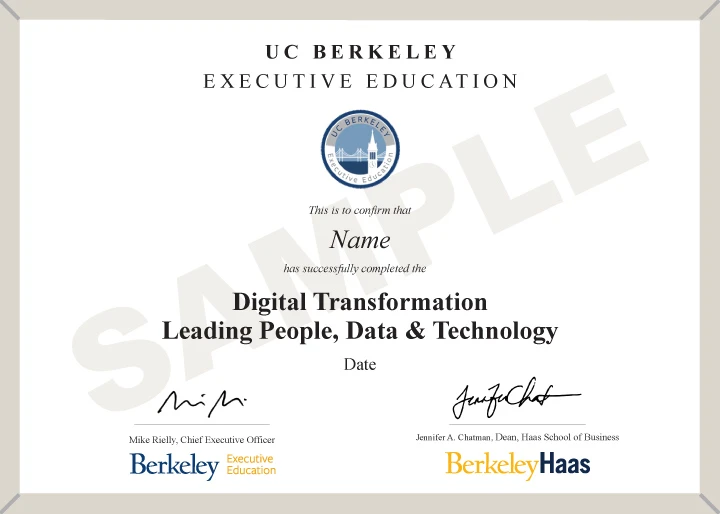Digital Transformation: Leading People, Data & Technology
Why Take This Program?
Every organization, regardless of industry and whether it sells goods or delivers services, is now an information company. From relationships with external partners and customers, to internal operations, digital technologies have changed how information is transmitted and processed. Consequently, every job function within every firm and industry is vulnerable to some manner of digital disruption.
With this program from UC Berkeley, identify and work with the three key components of digital transformation for your organization, namely—data, technology, and people—to make the leap toward staying relevant in a digitally centric world.
Enrolling in this program is the first step in your journey to alumni benefits.
Learn More
Key Takeaways
This program will position you to:
Identify opportunities to address specific problems within the firm and frame them in a way where a digital solution can be optimal.
Manage the organizational transformations, in the form of people and processes, required to enable measurable and significant change.
Navigate the legal and ethical considerations that surround digital business practices, such as privacy and data protection.
Your Learning Journey
Videos
Live Webinars
Peer Discussions
Case Studies
Assignments
Polls
Quizzes
Capstone
Live Office Hours
Program Topics
There’s no question that data and technology are key levers for digital transformation, but it’s also about people and organizational alignment. While much of this online program focuses on opportunities for advancing your strategic digital plan, there is also an emphasis on people and the organization.
Participant Testimonials




Program Faculty
Learn from our distinguished faculty at the forefront of information and communication technology, online marketing strategy and management philosophy.

Ewald T. Grether Professor of Business Administration and Public Policy | Co-Director, Computational Culture Lab | Co-Director, Berkeley Center for Workplace Culture and Innovation, Haas School of Business
Sameer B. Srivastava, an associate professor, studies the interplay of social group culture, individual cognition, and the relationships people build within and between groups...

Associate Adjunct Professor, Research Scientist
Thomas Lee is an Associate Adjunct Professor and Research Scientist in the Haas Operations and Information Technology Management Group at the Haas School of Business. He teach...

Professor of Marketing
Zsolt Katona holds a Ph.D. in computer science from the Eotvos University in his native Hungary and a Ph.D. in marketing from INSEAD France. He is a Professor of Marketing and...

Certificate
Get recognized! Upon successful completion of the program, UC Berkeley Executive Education grants a verified digital certificate of completion to participants. Participants must complete 80% of the required activities including a capstone project (if any) to obtain the certificate of completion. This program also counts toward a Certificate of Business Excellence.
Successful completion of this program fulfills two curriculum days (minimum requirement of 17 curriculum days) towards the UC Berkeley Certificate of Business Excellence (COBE).
Learn more about how it works.
Note: This program results in a digital certificate of completion and is not eligible for degree credit/CEUs. After successful completion of the program, your verified digital certificate will be emailed to you in the name you used when registering for the program. All certificate images are for illustrative purposes only and may be subject to change at the discretion of UC Berkeley Executive Education.

This program counts toward a Certificate of Business Excellence
Curriculum Days: Two days
Pillar(s): Strategy & Management and Entrepreneurship & Innovation
A UC Berkeley Certificate of Business Excellence gives individuals the opportunity to create a personal plan of study structured by our four academic pillars. Participants will earn a mark of distinction with certification from a world-class university, and enjoy the flexibility of completing the program in up to three years.
FAQs
Didn't find what you were looking for? Write to us at learner.success@emeritus.org or Schedule a call with one of our Program Advisors or call us at +1 864 668 8832 (US) / +44 121 387 3504 (UK) / +65 3129 7057 (SG)
Early registrations are encouraged. Seats fill up quickly!
Flexible payment options are available.
Starts On









